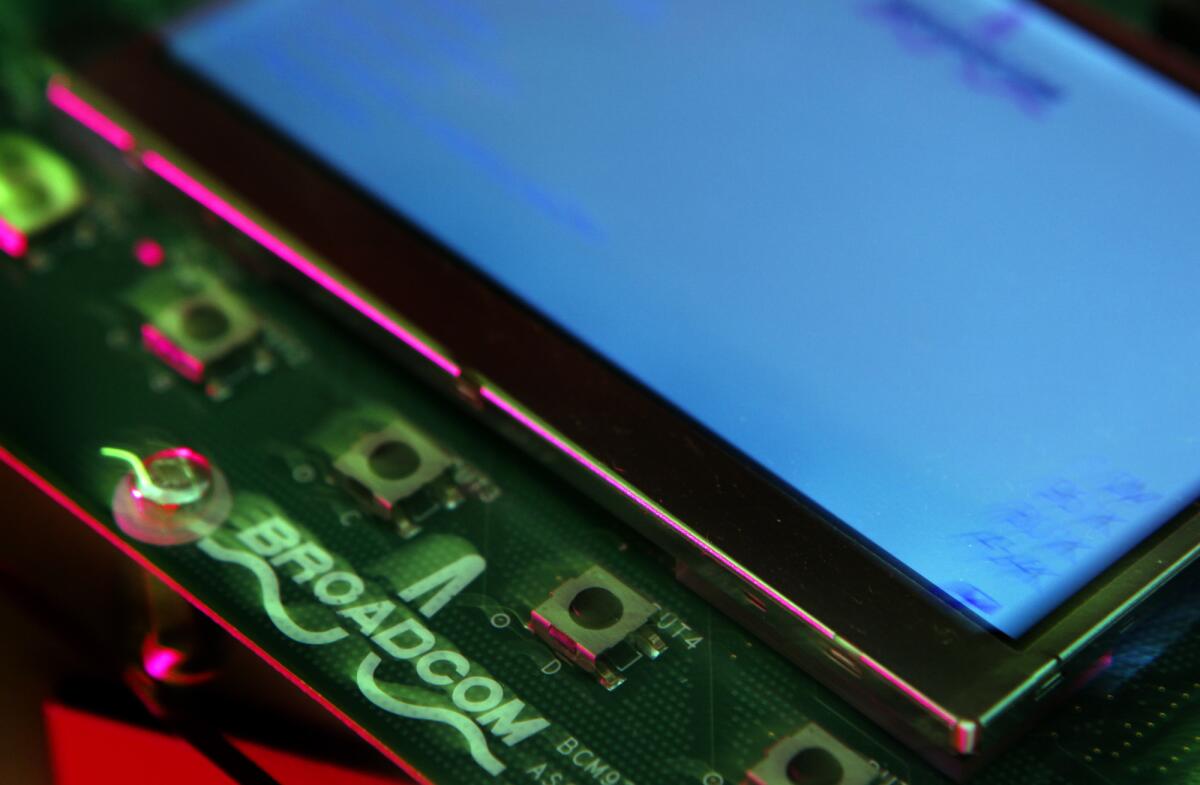Broadcom is said to be in talks on a sale to rival Avago

The Broadcom logo is stamped on a circuit board. Shares of the Irvine company jumped Wednesday on a report that it was in talks to be acquired by Avago Technologies.
- Share via
Pioneering semiconductor maker Broadcom Corp., an industry mainstay with technology in a wide array of computing products, may be seeing its days numbered as an independent company in Orange County.
The Irvine firm reportedly is in talks to be acquired by rival Avago Technologies Ltd. in Singapore in a deal that could be valued at $30 billion or more.
The companies did not respond to requests for comment, but their stocks soared in anticipation that Broadcom and Avago would strike one of the largest deals in the latest consolidation of the chip industry.
Avago executives undoubtedly will be asked about the reported talks Thursday when they’re scheduled to speak to analysts about the company’s fiscal second-quarter results.
Buying Broadcom would be the latest in a series of aggressive acquisitions by Avago, which also has executive offices in San Jose. This month, it bought networking products maker Emulex Corp. of Costa Mesa for about $606 million.
Avago is about half Broadcom’s size by annual revenue, but its market value at Wednesday’s close was about $34 billion compared with $28 billion for Broadcom.
Some analysts figured Broadcom could be in play, but the idea of Avago taking it over caught them off-guard.
“We are surprised because Broadband would be a very big fish for Avago,” said analyst Brian Colello at investment research firm Morningstar Inc. “Avago is at the forefront of trying to get bigger and break into new markets and [is] willing to pay for it.”
Founded in a Santa Monica condominium in 1991 by Henry Samueli and Henry T. Nicholas III, Broadcom today makes chips for the Apple iPhone, other smartphones and a range of consumer products including tablets, cable modems, routers and cable set-top boxes.
Broadcom also is a major provider of chips for more complex systems such as electronic switching gear, Wi-Fi, automotive systems and broadband connections.
With about 10,700 employees, including 8,000 devoted to research and development, Broadcom last year earned $652 million on revenue of $8.4 billion; it counts Amazon.com, DirecTV and Dell Computer among its customers.
One of Broadcom’s directors is Eddy Hartenstein, non-executive chairman of Tribune Publishing Co., owner of the Los Angeles Times.
Broadcom’s stock skyrocketed $10.09, or 21.5%, to $57.15 a share after the Wall Street Journal first reported the potential merger talks. Avago’s stock advanced $10.19, or 7.8%, to $141.49 a share.
Despite the growth of the digital and telecommunications markets, the chip industry “is not growing at double-digits” anymore, and that’s helping spawn the industry’s consolidation, said analyst Stacy Rasgon of investment firm Sanford C. Bernstein.
Chip giant Intel Corp. reportedly is in talks to acquire Altera Corp., and Dutch chip maker NXP Semiconductors has agreed to buy Freescale Semiconductor Ltd. in Texas for nearly $12 billion.
Avago formerly was part of Agilent Technologies, which itself had been part of Hewlett-Packard Co. until Avago was spun off in 2005.
The company focuses on semiconductors for data storage, wireless communications and industrial markets, among others.
Morningstar’s Colello said that there is little product overlap between Broadcom and Avago. Analysts also noted that Broadcom’s switching and broadband lines might be the main appeal for Avago.
“Avago plays a lot in the data-center communication side, and Broadcom’s infrastructure business is kind of a crown jewel,” Rasgon said.
Investors also see an opportunity for Avago to cut costs at Broadcom because “Avago has a history of being very efficient and bringing down costs,” said Romit Shah, an analyst with Nomura Securities who had told clients in March that Broadcom was an “attractive target amid industry consolidation.”
Avago could make Broadcom “leaner and boost earnings per share through cost cuts, which could certainly mean layoffs,” Shah said.
Amid Broadcom’s growth, company founders Samueli and Nicholas, who had resigned as chief executive in 2003, also weathered a federal prosecution in a stock-options backdating case in 2008.
Prosecutors had alleged that Samueli, Nicholas and two other executives hatched an elaborate scheme to secretly increase the value of employee stock options without disclosing the expense in regulatory filings as required. But a federal judge dismissed the charges in late-2009.
Samueli resigned as chairman in 2008 but returned to the post in 2009; he’s also the company’s chief technology officer. As an owner of the Anaheim Ducks, he also was temporarily suspended from the National Hockey League until shortly before he was cleared.
More to Read
Inside the business of entertainment
The Wide Shot brings you news, analysis and insights on everything from streaming wars to production — and what it all means for the future.
You may occasionally receive promotional content from the Los Angeles Times.









